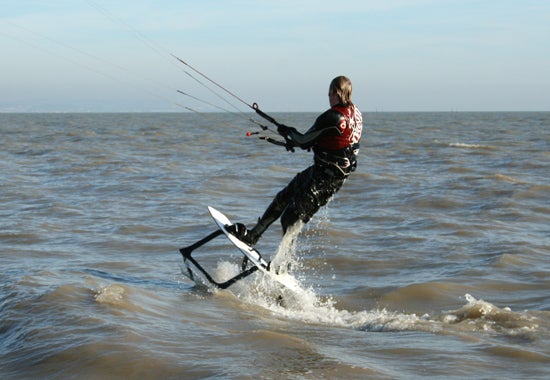On the crest of a wave

Your support helps us to tell the story
From reproductive rights to climate change to Big Tech, The Independent is on the ground when the story is developing. Whether it's investigating the financials of Elon Musk's pro-Trump PAC or producing our latest documentary, 'The A Word', which shines a light on the American women fighting for reproductive rights, we know how important it is to parse out the facts from the messaging.
At such a critical moment in US history, we need reporters on the ground. Your donation allows us to keep sending journalists to speak to both sides of the story.
The Independent is trusted by Americans across the entire political spectrum. And unlike many other quality news outlets, we choose not to lock Americans out of our reporting and analysis with paywalls. We believe quality journalism should be available to everyone, paid for by those who can afford it.
Your support makes all the difference.Kite surfing is a fast-growing extreme sport enjoyed by about 150,000 people worldwide. “I’ve developed a twin-tipped version that runs perfectly in both directions,” says Barney Townsend, 26. Like thousands of others, he has developed the business with the help of a Masters degree incorporating elements of innovation and entrepreneurship.
The average kiteboard, says Townsend, can cover a mile in four minutes – the same speed his grandfather Roger Bannister achieved on two legs in 1954. Hydrofoil boards lift them just above the water, enabling the extra speed, but are difficult to turn.Townsend is out to improve on that with his new SplitWave hydrofoil kiteboard.
He took a two-year part-time Masters in enterprise by learning contract at London South Bank University (LSBU) – and without it, he says, there would be no product. A university enterprise associate scheme paid his tuition fees and he won a £10,000 bursary from the London Development Agency’s Emerald Fund, a consortium of eight universities. “It gives me free office space, business mentoring and unrestricted access to LSBU’s workshops so I can build prototypes,” he says. Having researched his market, he has just applied for another £30,000. “LSBU also paid for my patent so no one could copy my idea, which was a massive weight off my shoulders,” says Townsend, who gets free use of the patent for three years, after which the university sees a return once sales reach a certain level.
The right to profit from one’s idea is something any student should think about before applying for one of the myriad of Masters (including MBAs) and business courses on offer, some of them costing £15,000 or more. Prospectuses can only tell you so much. Applicants are advised to contact programme directors and ask exactly what they will be taught where, when and by whom, and what they will be expected to produce. Talking to previous students is also important, as is the chance to meet real entrepreneurs and get hands-on experience.
Townsend says that his bursary interview, in which he had to pitch his idea, was just like Dragons’ Den. “Television has raised awareness of what being an entrepreneur is,” says Ossie Jones, professor of innovation at Manchester Metropolitan University (MMU). “It has demystified it, made it a bit more sexy.” Some people prefer to put their trust in distance learning and online discussion forums. Liz Smart changed career from financial services to set up AirBuggy, her business importing baby buggies. Married with three children, she took an Open University module in entrepreneurial opportunities. “I found it hard initially but my tutor was very good and it really helped me focus,” she says.
This autumn, MMUBS is launching an MSc in entrepreneurial practice, linked to its postgraduate incubator Inner Space. For a “nominal” amount, the incubator gives postgraduate entrepreneurs access to electronic resources, a mentor and networking events. The new Masters, aimed at people with and without business experience, will focus on giving students a thorough understanding of the existing marketplace. “There’s no substitute for getting out and talking to people,” says Jones. “I see the reverse of that in lots of over-theoretical student business plans.”
Another new course this October is the Masters in innovation and creativity in industry, run jointly by Cranfield University and University of the Arts London. “You can get perfectly competent designers in India, working digitally, for a third of the price you can here,” says Mike Goatman, the course director. “So we’ve got to stay a step ahead. This course will teach students to apply design thinking in technology-driven organisations.”
Many Masters courses offer bursaries and scholarships but an entrepreneur needs start-up cash. Manchester Business School administers a Masters in entrepreneurship, which teaches entrepreneurial finance – “a bit different from standard finance,” says Mike Luger, the dean. “It’s about where you get your venture capital from, the know-how to leverage money, the principles of finance, the fundamentals of management, and HR. We provide value-added for students who don’t have a strong business background.”
There is no shortage, either, of short courses for established entrepreneurs. The Saïd Business School, for example, is launching the four-day Oxford Private Equity Programme, which will provide “a robust guide” to this asset class, drawing on the expertise of senior industry insiders. Whatever course you are interested in, a good one can teach you to research the market, expose you to others who’ve done it and show you how to present your ideas to a bank manager. The rest is up to you.
Join our commenting forum
Join thought-provoking conversations, follow other Independent readers and see their replies
Comments